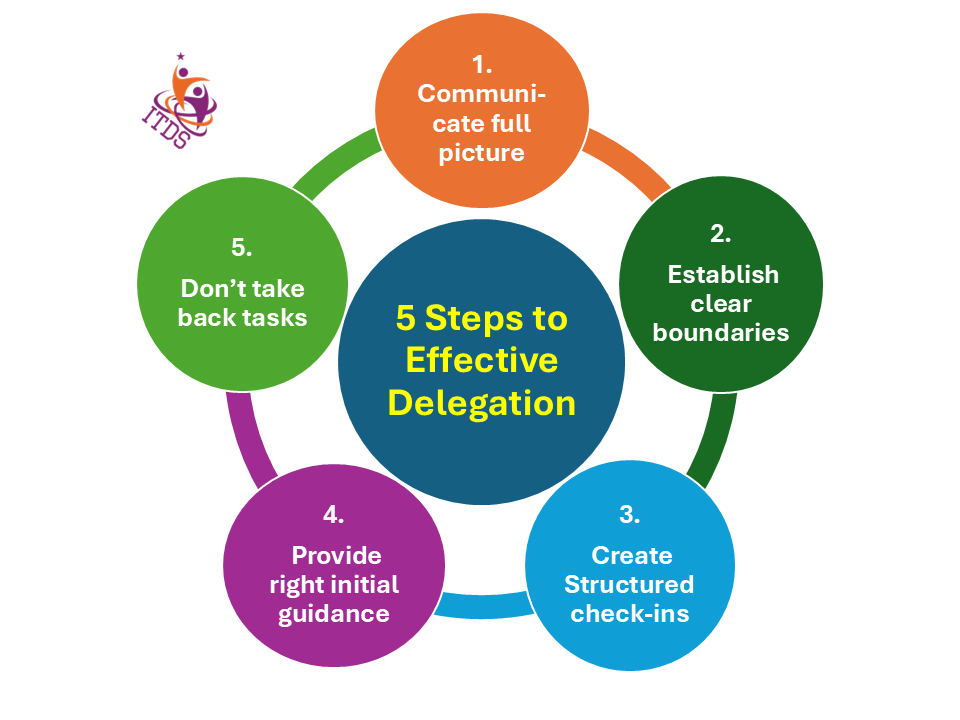
Last updated on October 13th, 2025 at 10:19 pm
Mastering Delegation: 7 Actionable Steps to Raise Your Efficiency
- Home
- Mastering Delegation: 7 Actionable Steps to Raise Your Efficiency

Mastering Delegation.
Just as it stands alone in the sentence above, when it is a problem in the operations of a small business, it has no competition.
And I totally get it.
You built your business on a foundation of blood, sweat and fear. You know that overnight success takes at least 1o years. You reached this point by consistently being chief cook and unwilling bottle washer.
And now, some small business consultant you hired “accuses” you of micro-managing and recommends your business turnaround should begin by mastering delegation.
Really?
Yes…Really, because many small business owners and entrepreneurs struggle with even the thought of delegation.
What is Delegation
Let’s be clear what we mean when we talk about delegation.
It is simply the process of assigning tasks, responsibilities, or authority to someone else while retaining overall accountability for the outcome.
As a small business owner, it involves giving selected employees the power to act on your behalf or make decisions within defined boundaries, while you remain ultimately responsible for the results.
It’s about distributing work and decision-making to others rather than trying to do everything yourself.
In essence, delegating requires you to:
- Admit you can’t do everything alone
- Trust others with important tasks
- Accept that outcomes might differ from your ideal positions
Why Delegation Matters
While it may be simple in definition, many small business owners struggle with the concept, viewing it as a sign of weakness or loss of control.
But in reality, effective delegation is a critical leadership skill and growth opportunity that results in the following benefits:
- Free up your time to focus on high-value strategic activities
- Develop your team’s skills and potential
- Increase overall business productivity
- Reduce your personal stress and prevent burnout
- Create a more engaged and motivated workforce
- Help you to discover and fix your limitations and potential weaknesses
Why there is so much resistance to mastering delegation
Since there are obvious important benefits to mastering delegation, why then do small business owners resist it so vigorously?
Well, if you remember, I have been telling you that the biggest problem small business owners have is trying to run a $10m business with $1m thinking or skills.
So we can’t suddenly expect them to put on “big boy/big girl’ or any other size pants and lovingly embrace delegation.
What happens instead is that the resistance shows up in several other forms. I’ve listed some of them below for you:
1. Ego issues and perfectionism
Many business owners believe that because they started the business with a specific idea or skill, they are the only one who can carry out many tasks correctly and quickly.
This ego-based belief makes it difficult for them to trust others with important tasks, fearing that to do so will result in low or even poor quality work.
It also prevents them from seeing delegation as a leadership strategy and this keeps them continually micromanaging or avoiding delegation all together.
2. Fear of losing relevance and control
Just imagine, you built your business on a specific set of skills and the business is doing “alright.”
Who can blame you, if any thought of delegating even a small part of your core operations, create a mental picture of your business no longer needing you?
As a client lamented to me, the thought of no longer being relevant in her own business feels like a hostile takeover in which she has lost all control.
3. Don’t have the skills and confidence for delegation
You can’t avoid it. Successful delegation requires:
- assessing the employee’s capabilities
- assigning tasks appropriately
- providing meaningful feedback
- giving the employee the responsibility to make decisions and holding them accountable.
Without adequate training and coaching in communication skills, assertiveness skills and performance management, small business owners might not have the confidence to master delegation.
Trying to acquire these skills while trying to delegate without causing confusion requires a balancing act that even a trapeze artist might envy.
4. Limited by “small picture” thinking
This is another critical delegation issue.
Think about it – the business revolves entirely around the founder’s personal involvement in every decision and task.
We can almost predict that they will have difficulty seeing the bigger picture that scaling the business through delegation can bring.
Not only does this also lead to the classic case of founder’s syndrome but growth becomes constrained by the owner’s available time, energy and insights.
5. Fear of sharing sensitive information
In some businesses, delegating might require the business owner to share some sensitive information, for example, trade secrets.
Let’s face it, small businesses often operate in tight-knit local markets where information travels quickly. Revealing customer lists, pricing strategies, or business processes to the wrong employee could directly benefit competitors.
In addition, they might have their personal assets tied to the business. It’s not hard to understand their reluctance in sharing financial information when their home, savings, and family’s security could be at risk.
No wonder small business owners would rather not delegate if it means sharing sensitive information which employees could use to hurt them.
6. Lack of systems and processes:
Ideally, sound business systems and established procedures make delegating worthwhile, faster and more efficient.
Small business owners often fear that if they are going to benefit from delegating, they would need to invest time and money in the right systems and procedures.
Since both time and money are usually in short supply in small businesses, mastering delegation is placed on the farthest back burner and for a long time.
7 Actionable Steps to Mastering Delegation
Despite all the foreboding and apprehension, the bottom line is, mastering delegation is one of those investments that will pay dividends once you get the hang of it.
So to get you started, here are 7 actionable steps, either new or experienced small business owners can take, to become effective at sharing the tasks in their workplace.
1. Start with the right mindset
I can’t stress it enough…delegation is a critical leadership skill, despite that, many business owners find it incredibly challenging.
Much of this challenge is rooted in personal fears and lack of confidence.
Naturally, you end up with a mindset in which you will try but you feel that you are doomed to fail even before you begin.
A better mindset for you to start with is one where you are clear that when you delegate you are:
- Scaling your business beyond your personal capacity
- Building a more flexible and adaptable business
- Creating a culture of trust and employee engagement
- Improving employee satisfaction and retention
If you can make that mindset shift, as your first step to mastering delegation, you will be well on the way to success.
2. Prepare yourself for the process
Once you’ve made the mindset shift, a good next step is to prepare yourself for the process. In this way, you don’t start from ground zero, further undermining your confidence.
Here are some practical ways business owners can build their delegation skills:
1. Read targeted books and other resources – the productive hack collection is a good place to start.
2. Learn from other business owners – Join local business owner groups, chambers of commerce, or industry associations where you can discuss delegation challenges with peers.
3. Take management training courses – for example, look for workshops on leadership and management skills which are designed specifically for small business owners and focus on practical skills rather than theory.
4. Learn from yourself – Study your own patterns of managing. Use a journal if you have to. This process can provide valuable insights.
5. Find a mentor or coach – Connect with business owners who’ve successfully scaled their operations or consider working with a business coach. She or he can provide personalized guidance and accountability as you develop the necessary delegation skills.
3. Choose the right tasks to delegate
Your next step is to choose the right tasks to delegate, acknowledging that every task should not be delegated. To do this:
1. Document everything you currently do in a specific timeframe. (a week)
2. Then identify tasks that don’t require your unique expertise or decision-making authority.
3. Good examples of these tasks include, data entry, social media posting, basic customer service responses, or appointment scheduling.
4. Avoid delegating tasks involving sensitive decisions, key client relationships, or activities only you can legally perform.
4. Select and prepare your employees
In selecting and preparing your people, proceed as follows:
1. Assess each person’s current skills, interests, and capacity. Look at their track record with similar tasks and note their preferred working styles.
2. Accept that others may do things differently from you and that’s okay.
3. Walk through the tasks step-by-step at least once, then leave the employees to come up with creative ways to execute them.
4. Create written procedures or checklists for complex tasks
5. Start new people with lower-stakes tasks where mistakes won’t be costly.
6. DO NOT select by favouritism!
5. Take the plunge and delegate effectively

Now that we have so thoroughly prepared the groundwork, you have no choice but to take the plunge and delegate effectively!
Don’t worry, here’s a detailed breakdown of how to delegate effectively. Remember, the most effective delegation feels more like collaboration instead of you just dumping work on your team.
1. Communicate the full picture Don’t just tell someone what to do – explain why it matters. Share how their task fits into larger business goals and what success looks like from the customer or company perspective.
2. Establish clear boundaries and authority levels – Define what decisions they can make independently, what requires your input, and what needs formal approval. This prevents constant interruptions while maintaining necessary controls.
3. Create structured check-ins – Rather than hovering or waiting until deadlines come up, schedule regular progress reviews. For example, for projects, you can set milestone reviews at 25%, 50%, and 75% completion points.
4. Provide the right level of initial guidance – New team members or complex tasks need more detailed instruction and frequent check-ins. Experienced people handling familiar work need less oversight.
5. Resist the urge to take back tasks – When people struggle or make mistakes, coach them through improvements rather than reclaiming the task. Taking work back sends a message of failure which discourages growth and initiative.
6. Implement support systems
It’s not enough to take the plunge and delegate effectively. To be truly efficient and effective, you have to support the implementation with support systems. Doing so will also make the process less stressful.
The most successful approach typically combines multiple systems and evolves as the business and team mature. So here are some support systems you can start with:
1. Standard Operating Procedures (SOPs) Create clear SOPs which can help you to hand off work consistently. These can include step-by-step guides, checklists, and templates that reduce guesswork and maintain quality standards.
2. Training and skill development programs – Investing in employee training, whether through formal courses, mentoring, or cross-training with other team members, builds the competency needed for successful delegation.
3. Performance tracking systems – Setting up metrics, deadlines, and quality benchmarks gives both parties clear expectations and measurable outcomes. But keep these systems simple to start.
4. Establish “Circles of Experience” – This is a form of mentoring which I use either in a business or among a group of clients. It provides a type of safe space where colleagues confidently learn from and teach each other.
5. Strong HR support – Having employment agreements, non-disclosure agreements, and clear job descriptions protects the business while sharing roles and responsibilities.
7. Avoid these key delegation pitfalls:
I don’t have to tell you that assigning some of your responsibilities to some of your employees comes with its own pitfalls. Apart from what you have already worked out from all the information above, here are a few I want you to keep in mind:
1. Delegating and Micromanaging – The biggest pitfall is delegating a task but then behaving like a helicopter parent. When you hover over every detail, check in constantly, or dictate exactly how it should be done, this frustrates team members who feel they have responsibility without authority.
3. Delegating and Disappearing – This is as bad as delegating and micromanaging. It’s when you completely disappear after delegation without scheduled check-ins, feedback, or being available for questions. Come on, different employees need different levels of support and abandoning them entirely is just as bad as micromanaging.
4. Inconsistent Delegation Standards – Having different expectations or levels of oversight for different team members. Without clear explanation, this can create perceptions of favoritism or unfairness which undermines the very delegation efforts.
5. Unclear Expectations and Authority – No clear indication what success looks like. No idea what resources are available. No decision-making authority. If you delegate without these, not only are you behaving like my mother, you are actually setting up the employee for failure from the very outset.
6. Delegating to the Wrong Person – Automatically giving tasks to whoever is available or willing. This is a serious pitfall. You need to consider who has the right skills, capacity, or would best benefit from the development opportunity. If you don’t you are really creating chaos, conflict and confusion.
Your next “mastering delegation” step…
In case you start reading this post from the bottom, I have given you 7 actionable steps to mastering delegation.
The key is finding the right balance between providing clear direction and allowing autonomy, while matching tasks appropriately to people’s skills and development needs.
Delegation is a skill. And like most skills, it can be learnt.
Yes…It takes practice, patience, and a willingness to let go.
But if you start small and be consistent, you will soon find that delegation has become a powerful catalyst for your small business’s growth and success.
Remember, the most successful entrepreneurs aren’t those who do everything themselves, but those who build and empower great teams.



